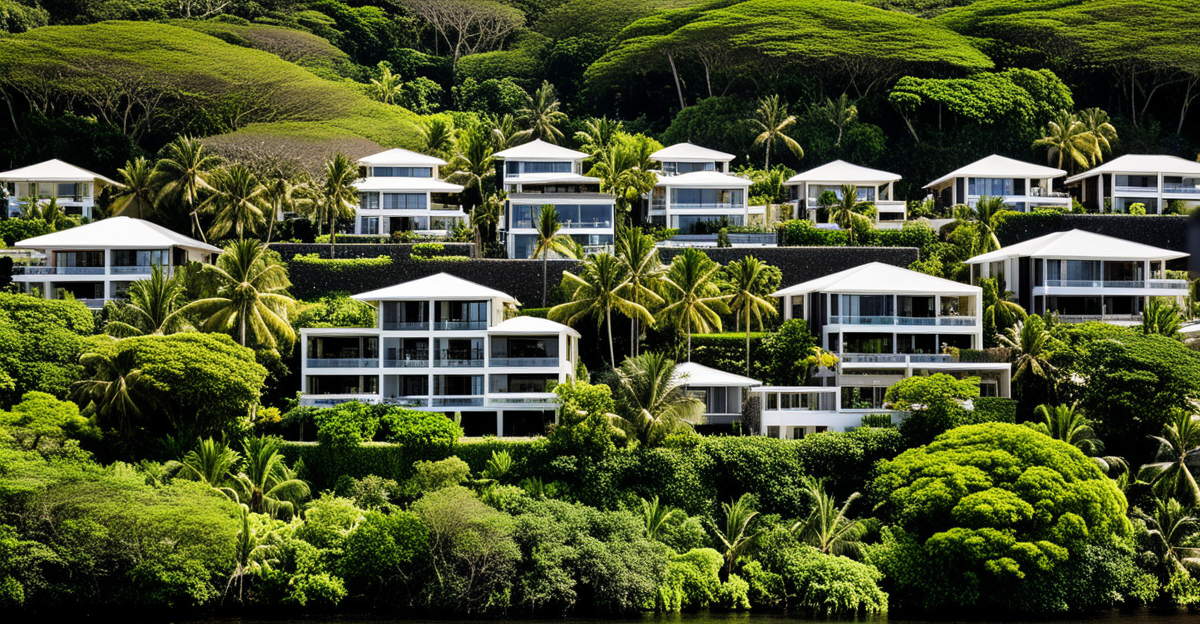Navigating the growing mauritius residential property market

Mauritius’s residential property market is evolving rapidly, driven by regional price differences and varied property types. Investors and buyers must understand local trends, including price fluctuations, rental strategies, and government incentives. Strategic choices support both capital growth and income generation, making this market appealing for those seeking informed opportunities in one of the Indian Ocean’s most dynamic real estate landscapes.
Mauritius Residential Property Market: Key Dynamics, Price Trends, and Investment Insights in 2024
Statistically, the residential property price index surged by 27.19% year-on-year in Q3 2024, signifying a robust upward trend. In practice, average house listing prices now approach MUR 28.5 million (USD 620,000), while apartments sit around MUR 21.7 million (USD 457,000), with regional price disparities especially pronounced—luxury estates in the East regularly exceeding MUR 74 million (USD 1.57 million).
A voir aussi : Clogged toilets : what can you do ?
Property values vary according to type and location: villas and prime urban apartments draw the highest per-square-meter rates, and coastal North and West zones remain especially sought-after due to tourism and ongoing infrastructural investments. These dynamics are fueled by a resilient economy, major road and metro upgrades, and targeted government incentives for foreign buyers.
Market access has expanded through schemes such as PDS, IRS, RES, and G+2, each designed to facilitate both foreign and local acquisitions. Notably, foreign acquisitions are concentrated in the North and West, with strong activity from European and South African investors. The supply of new dwellings has grown—over 7,800 units now exist under government-backed programs—but a 13.9% vacancy rate signals ongoing opportunities for investors seeking rental yield, capital appreciation, or relocation.
A découvrir également : Car Insurance in France: a guide for english-speaking drivers
Despite a modest dip in new building permits, higher-value projects and social housing initiatives support further growth. Rental rates, particularly in short-term holiday markets, have outperformed long-term leases, emphasizing the attraction of flexible investing models. Mauritius thus continues to attract interest from buyers and developers considering the local economic outlook, growth in visitor numbers, and favorable lending terms. For more informations, click here : https://www.barnes-mauritius.com/en/luxury-real-estate/mauritius.
Influential Factors, Market Segmentation, and Investor Considerations in Mauritius Real Estate
Property market segmentation by type, price, and region
Mauritius real estate trends show clear segmentation by residential property types Mauritius, with marked regional price differences Mauritius. Coastal districts, especially in the East, lead in price due to the appeal of luxury homes in Mauritius, while the Centre provides more affordable housing Mauritius options. Villas and upscale apartments are in demand among foreign buyers, boosting the visibility of residential property types Mauritius and driving up average prices in sought-after areas. In contrast, duplexes and smaller units cater to local buyers and the affordable housing Mauritius segment.
Ownership rules, foreign buyer schemes, and regulatory framework
Mauritius real estate regulations enforce distinct rules for offshore property ownership Mauritius. Local vs foreign property buyers Mauritius participation is shaped by government-approved investment schemes, limiting international purchases to specific projects. These rules help maintain balance in the property market while enabling foreign investment in Mauritius property through defined pathways. Understanding Mauritius real estate regulations is essential for buyers to navigate legal frameworks and optimize opportunities, especially for those seeking investments or residence.
Rental strategies and returns
The property rental market Mauritius offers both long-term and seasonal opportunities, with rental yield Mauritius averaging between 3.5% and 9% depending on location and type of residential property. High-demand tourist zones produce better yields for luxury homes in Mauritius; however, affordable housing Mauritius provides steady income for local landlords. Returns are heavily influenced by occupancy rates and property price fluctuations Mauritius—prompting buyers to analyze current and projected performance before investing.
Policy, regulation, and macroeconomic influences
Government housing policies Mauritius, such as loan rebates and incentives for residence-permit-linked investments, strongly drive real estate demand drivers Mauritius. Interest rate shifts affect mortgage availability, impacting both local vs foreign property buyers Mauritius. Continuous improvements in infrastructure impact on property market Mauritius by raising appeal in emerging neighborhoods. Policy changes and external economic conditions may increase property market risks in Mauritius, leading potential investors to seek updated analysis and expert guidance.
Critical challenges and trends
The residential property market faces housing supply constraints, with construction costs and building permits trends Mauritius highlighting barriers to new development. Urban development in Mauritius, the emergence of new residential property types Mauritius, and higher-end projects have shifted market dynamics. High competition for limited residential land availability Mauritius further drives up prices. Investors remain alert to property price fluctuations Mauritius and the balance between supply and demand, while policy direction, demographic impact on housing demand Mauritius, and future housing affordability index Mauritius continue to shape the outlook.
Dynamic Shifts in Mauritius Residential Property Market
Mauritius real estate trends in 2024 showcase marked fluctuations in residential property prices Mauritius, tightly connected to regional preferences and property types. Key property demand in Mauritius drivers include economic recovery, tourism, and sustained foreign investment, making luxury homes in Mauritius and affordable housing Mauritius increasingly significant.
The Mauritius housing supply and demand equation remains challenging: the rise in residential construction has yet to offset mounting demand, reflected in the property price indexes Mauritius showing double-digit growth. Government housing policies Mauritius, notably incentives for foreign buyers under Property Development Scheme (PDS) and Integrated Resort Scheme (IRS), fuel offshore property ownership Mauritius. These schemes not only bolster foreign investment in Mauritius property but create a segment where local vs foreign property buyers in Mauritius see distinct price access.
Meanwhile, urban development in Mauritius—supported by government infrastructure investments Mauritius—stimulates both new housing developments Mauritius and rental demand trends, causing property price fluctuations Mauritius across coastal properties Mauritius and popular residential areas Mauritius. Rental yield Mauritius, especially in tourist zones, continues to outpace traditional rental markets, enhancing the appeal for real estate investment Mauritius.
